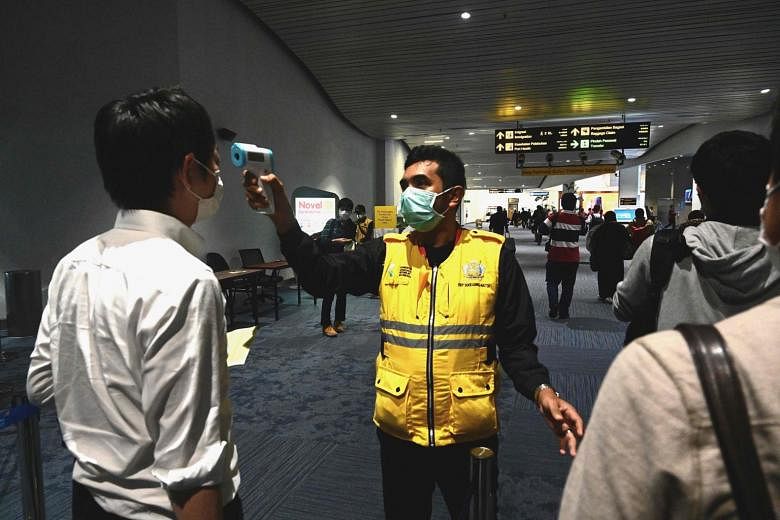JAKARTA (THE JAKARTA POST/ASIA NEWS NETWORK) - Concerns about how the Indonesian government is handling the coronavirus outbreak have grown, as none of the 132 Indonesian lab tests for the virus came back positive as of Wednesday (Feb 26).
This week, a hospital in Semarang, Central Java, and another in Batam, Riau Islands, each reported the death of a patient who had symptoms similar to the new coronavirus. Both patients' tests came back negative, officials said.
The patient in Semarang, an Indonesian national aged 37, died not of the coronavirus disease (Covid-19) but of bronchopneumonia, said Kariadi General Hospital medical and nursing director Agoes Oerip Poerwoko on Wednesday.
"The patient had tested negative for the coronavirus based on an observation from the Health Research and Development Agency (Balitbangkes) in Jakarta. Balitbangkes did the examination," Dr Agoes said.
On Wednesday, the Batam Health Agency reported the death of a 61-year-old Singaporean man. He went to the emergency room of a private hospital with symptoms consistent with those of the coronavirus on Feb 20. The private hospital sent him to Batam's referral hospital for the coronavirus after the doctor found he had fever and shortness of breath.
The agency, however, said he died of "another illness", not Covid-19, because the patient's test results for the virus came back negative.
The diplomatic community in Jakarta and public health experts, however, have raised concerns about the accuracy of the lab tests.
A leaked document circulated throughout the diplomatic community in Jakarta and obtained by the Sydney Morning Herald on Wednesday warns of diplomats' "critical" concerns about Indonesia's handling of the coronavirus.
The document instructs diplomats to provide messages such as "we believe it is critical for your government to be actively conducting case detection", the Herald reported.
Another point was "many hospitals do not have adequate PPE (personal protective equipment), not enough isolation beds, and specimen transportation is inadequate", according to the Herald.
"The reference to inadequate specimen transportation reflects concerns that some of the specimens tested for coronavirus may not have been properly refrigerated in transit," the report said.
The World Health Organisation (WHO) states that each of the specimens should be stored and shipped at 4 deg C if they will reach the laboratory in less than 72 hours, and at -20 deg C, or ideally -80 deg C, on dry ice or liquid nitrogen if they will reach the laboratory in more than 72 hours.
A microbiology researcher from the Indonesian Institute of Sciences (LIPI), Mr Sugiyono Saputra, suggested Indonesian health authorities send samples from suspected coronavirus patients to the WHO-appointed referral laboratories for confirmation amid growing scepticism at home.
"By doing so, we can evaluate our testing capacity. We can also take required countermeasures if some of the samples eventually test positive," he said, adding that referral laboratories were spread across 15 countries, including Australia, Thailand and neighbouring Singapore.
He warned against complacency in handling the deadly virus, as many things could go wrong during the sample-testing process. "(Errors) can result either from the tools or the humans that perform the testing."
Dr Samsuridjal Djauzi, an immunology expert at Cipto Mangunkusumo Hospital, said not all tests were 100 per cent accurate. The results depend on "how (testers) take, store and send the specimens. They also depend on the testing tools".
A false result - positive or negative - can occur if there is an error in the procedure.
Dr Samsuridjal said it was not entirely impossible for Indonesia to have zero cases. However, he said Indonesia should have tested more specimens.
The Indonesian Health Ministry reported that as of Tuesday, it had tested 132 specimens from 44 hospitals in 22 provinces and that all had come back negative. Singapore has conducted more than 1,200 tests and Malaysia more than 1,000.
Health Ministry disease control and prevention director general Anung Sugihantono declined to answer the Post's questions about the growing concern about the lab testing procedure. Balitbangkes head Vivi Setiawaty did not respond to the Post's request for comment.











